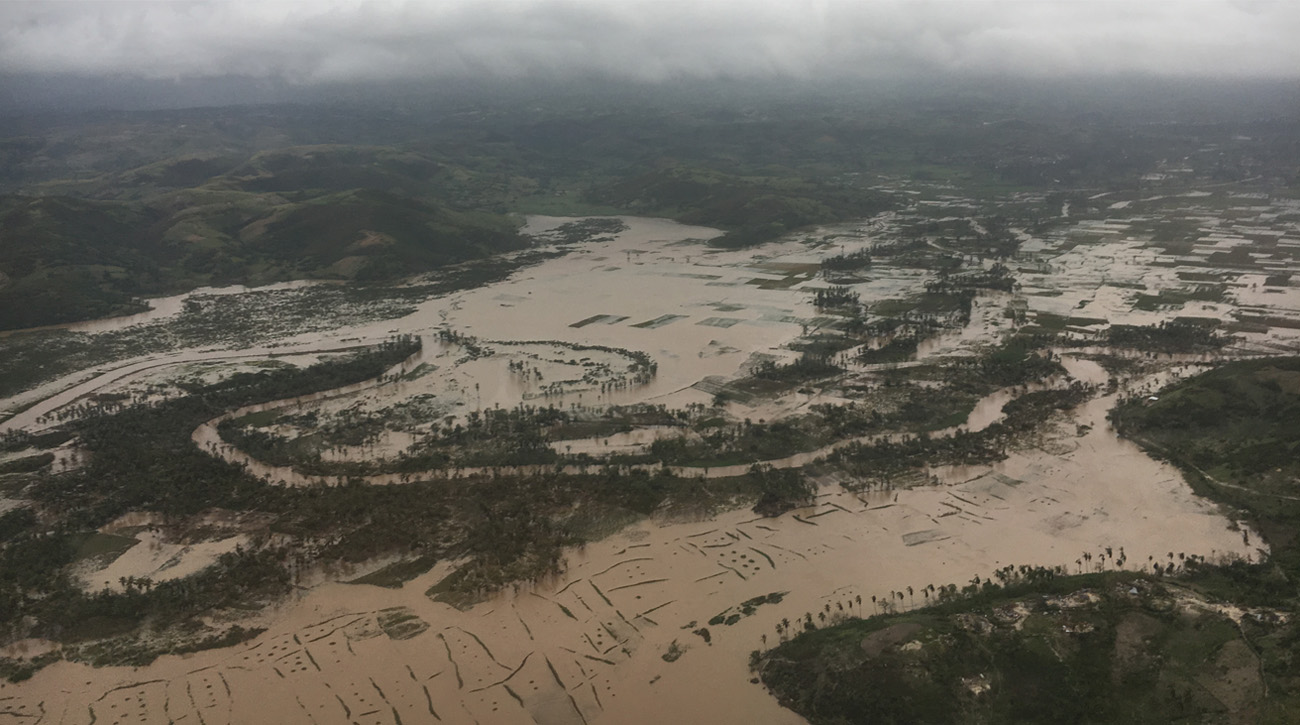Last month, when Hurricane Matthew hit the small Caribbean country of Haiti, Milken Institute School of Public Health (Milken Institute SPH) student Kathleen Corrigan was one of the first responders on the ground. Corrigan has over ten years of experience in critical care and trauma nursing. She left Haiti where she was working in a small emergency/critical care facility in Port-au-Prince to pursue her Master of Public Health in global health program design, monitoring and evaluation. When she heard the hurricane was going to strike Haiti, she re-connected with her former colleagues, and was soon traveling with a team of eight as an Innovating Health International (IHI) staff member and their partners Haiti Air Ambulance (HAA).
All air travel to the region had been cancelled, but the team was able to make the trip thanks to the generosity of a HAA funder who gave them access to a private jet. The country’s roads had been destroyed, so the aid workers had to travel by helicopters to affected areas. While there was minimal loss of life, the structural devastation was overwhelming.
Corrigan, along with an IHI team member, flew to Dame Marie on the far southwestern coast of Haiti where they spent five days addressing needs like wound care, administering antibiotics to prevent infections and tetanus vaccines. The damage had not only destroyed houses and medical facilities, but also destroyed sanitary water sources for many communities. Corrigan soon saw cases of cholera appearing, and dehydration was a big concern.

The city of Dame Marie, about a week after the hurricane. A small amount of the debris thrown from the ocean onto the shore is pictured. Storm surges were up to 30ft. Credit: Kathleen Corrigan
On her fifth day in Haiti, Corrigan traveled to Anse d’Hainault where there were reports of a massive cholera outbreak. “I met with both the hospital director and the mayor of the town,” she said. “I reported what I found to a Water, Sanitation and Hygiene (WASH) representative of the Office of US Foreign Disaster Assistance as well as the cluster groups for health surveillance and emergency response.” The town, with a population of about 35,000, had 80 cases of cholera, 4 deaths in the hospital and 1 in the community. Their purified water system had been destroyed in the storm and they needed assistance with water, shelter and food. Corrigan’s report led to a support team and supplies coming to the town to fix their water system and create a reliable source of potable water.
While her previous medical training was helpful, Corrigan was thankful for the skills she is learning in her MPH program. “Understanding how to do needs assessments and disseminate accurate knowledge was probably the most important thing to do in those initial days,” she says.
Corrigan says that this event further demonstrates the severe wealth disparity that exists in Haiti as the country’s poor were the most affected. “The Haitians, however, are resilient,” she says, and while the road to rebuilding their country is a long one, they are prepared to do the work.
Corrigan encourages individuals who want to assist to give to organizations that are registered in Haiti. This helps Haitians by giving them work or providing them with materials from Haiti, she says. “Being aware of the situation and knowing who to give to are the most important things we can do,” Corrigan says. “Find an organization that you trust and give to them.”


